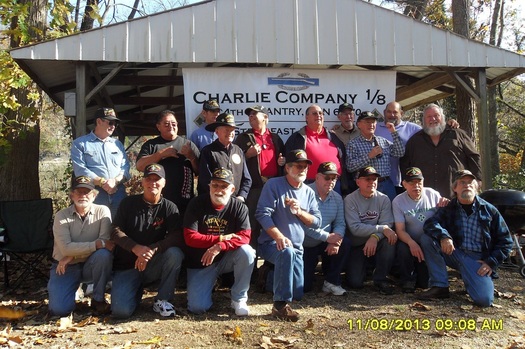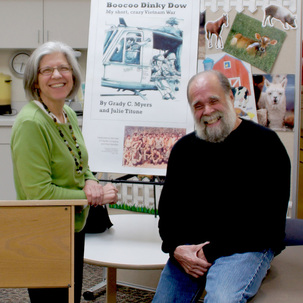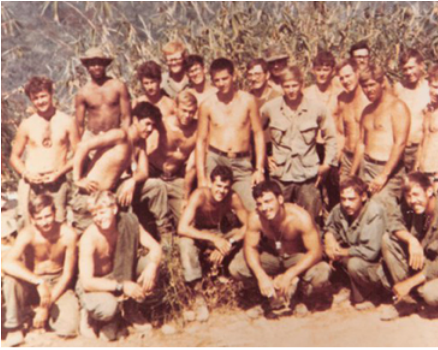 Charlie Company's 2013 reunion (courtesy of Bob Robbins) Charlie Company's 2013 reunion (courtesy of Bob Robbins) Grady Myers, whose Vietnam Army comrades knew him as Hoss, was ill by the time he knew about Charlie Company's annual November reunion in Branson, Mo. He died before he could attend. No doubt he'd have felt right at home there, telling tales and bragging about family with the best of them. Grady was an M-60 gunner in Company C, 1st Battalion, 8th Brigade, 4th Infantry Division. In his memoir "Boocoo Dinky Dow: My short, crazy Vietnam War," Grady explains, with amusement and chagrin, how Company C became known as Combustion Charlie. Its reputation for pyrotechnics began on Christmas Eve, 1968, just after Grady arrived at Fire Support Base 30. Holiday steam-letting got out of hand. Among other craziness, a guy calling himself Chicken Man took over the radio and broadcast some decidedly unofficial communications. I was reminded of that hilltop party when I came across this veteran's tape recording from that same Christmas -- in the case of this sober radioman at forward Landing Zone Jake in III Corps.
2 Comments
 Fourth Platoon's new lieutenant, writes Grady Myers in Boocoo Dinky Dow, "was a stocky Californian with a thick moustache that curled up on the ends. He told us how he used to live on the third floor of a warehouse in L.A." His name was George and he was "so mature, a natural officer." George was also one of three men who were killed on March 5, 1969. That's when members of Charlie Company, 1st Battalion, 8th Regiment, 4th Infantry Division, walked into an ambush near the Cambodian border. He is the only soldier lost that day who is mentioned by name in the book -- and then, only by his first name, because that is how Grady remembered the popular platoon leader. In the ambush chapter of the memoir, he recalls how the last words the lieutenant said may have been some good-natured ribbing that he gave Grady. And he recalls the impact of George's death. The medic returned to bandage my arm, rewrap my leg wounds and tear open my bloody shirt to look for more damage. Then he moved on to another wounded man who was lying a couple of yards to the left. To my right was George’s body. George’s death had devastated the radio operator, who had been his friend, assistant and roommate for nearly a month. I could hear the big RTO crying like a kid into the phone as he called in air strikes. His sobs were more easily understood than his directions. George was dead. The lieutenant was gone. I'm grateful to Charlie Company veteran Bob Robbins for supplying George Callan's last name, as well as the name of that heartbroken radio operator: Dennis Harris. I'm grateful to DelShahn, the volunteer at the Vietnam Veterans Memorial, who sent me an etching of Lt. Callan's name as it appears on the Wall in Washington, D.C. Most especially this Memorial Day, I am deeply aware of the sacrifices George and the others who died in Vietnam, and of men like Grady, who suffered greatly because of the war but lived to share their stories.  Victor with Julie at Pullman reading Bridging the gap between composition explosives and literary composition, Victor Villanueva Jr. survived combat in Vietnam and went on to become a distinguished professor of English. Not bad for a high school dropout. When one of his colleagues at Washington State University told me Victor served in the Army in Vietnam, I contacted him out of the blue and asked if he would be the guest reader at "Boocoo Dinky Dow" book event at the Neill Public Library in Pullman. I explained that I always invite a man, usually a veteran, to join me at readings to give voice to Grady, who died in 2011. Victor graciously agreed. When he read Grady's memoir, he was astounded to realize he may actually have seen Grady in Vietnam. "I was in country August 1968 to September 1969. Grady and I were in the same place during much of the same time! This is eerie!" Victor's 13 months in country -- six months as a grunt, the rest as a clerk -- overlapped with Grady's three months. He'd been to Fire Support Base 30, where Grady's squad leader gave him the nickname Hoss and made him an M-60 machine gunner. He was also at Blackhawk, a camp where he heard the explosions that Grady describes in "Boocoo Dinky Dow," one of the many exploits that cemented Charlie Company’s reputation as Combustion Charlie. It was, officially, C Company, 1st of the 8th, 4th Infantry Division. Victor's best friend was its clerk. "His name was Charles Shinedling, so we called him Shingaling like the song and the dance," said Victor, whose own buddies called him Vanilla Wafer, a riff on his Puerto Rican last name. Victor was also a clerk in the first 1st of the 8th, working for Delta Company. Before that, in combat mode, he carried a radio with an antennae that extended above his head. It was heavy. Victor, who is not a big guy, laughed as he recalled falling backwards onto the ground every time he hopped off a helicopter. Grady's story brought back intense memories for Victor. Such as seeing a buddy die, intestines spilled onto the ground. He described how his squad once fired madly at night-time movement in the jungle, discovering in daylight that they had decimated a record-sized Bengal tiger. Victor's stories, along with his thoughts on the draft system and racism’s role in war, enriched the Pullman reading. At the upcoming "Boocoo Dinky Dow" event at the National Veterans Art Museum in Chicago, the guest reader will be a veteran who was too changed by Vietnam to finish college and live out his dream of being a teacher. Now, he uses art to teach younger generations about the impact of war. I am so happy to see this. About time that Steve Stotka, Brent Longest and others got mention. I was Asst. Machine Gunner to Andy Day so have a personal love of the M-60. Still trying to reconstruct my memoirs on this. Some have been posted on our site for the 1/8th C Company, but the account of the battles for FSB29 is much more complicated and entailed. Good job. Makes "happy" tears come to my eyes. -- Patrick Flanagan
Memo to Charlie Company ... and all of you _ Grady Myers was an M-60 machine gunner in Company C’s 2nd Platoon, 1st Battalion, 8th Brigade, 4th Infantry Division in late 1968 and early 1969. If you served with him you knew him as "Hoss." When you read his memoir "Boocoo Dinky Dow," as I hope you will, it's bound to stir up some memories that are very different from his. After all, this book is one man's recollection of an intense and chaotic time when, as Grady put it, "we were all just kids."
I created this blog so that you could share your own versions of what happened in training and in country, or what's happened in your lives since then. Comments of other veterans, family and friends -- all readers -- are also welcome. I'd like to hear, for example, how today's war experiences compare to those in Vietnam. Just send me an email with your message and I'll turn it into a blog post. Grady liked nothing better than a good story -- his always included sound effects -- so fire away. |
Julie Titone is co-author of the Grady Myers memoir "Boocoo Dinky Dow: My short, crazy Vietnam War." Grady was an M-60 machine gunner in The U.S. Army's Company C’s 2nd Platoon, 1st Battalion, 8th Regiment, 4th Infantry Division in late 1968 and early 1969. His Charlie Company comrades knew him as Hoss. Thoughts, comments? Send Julie an email. Archives
November 2018
|

 RSS Feed
RSS Feed